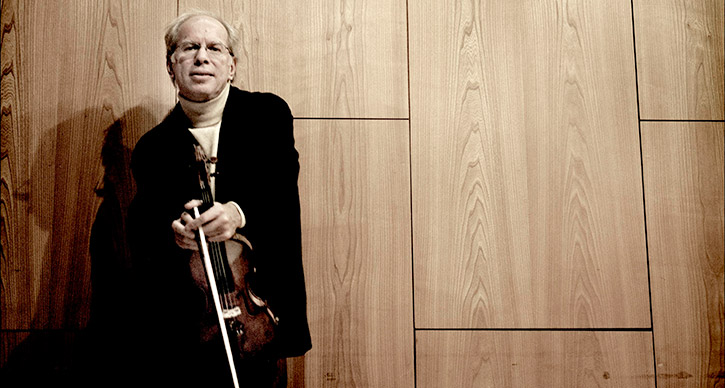A Slice Of Cold War History With Kremerata Baltica
Editor’s note: The program for this performance was altered slightly at the request of the artists. Check out our up-to-date program information.

Photo: Gidon Kremer, violinist and leader of Kremerata Baltica. They’ll perform in Ann Arbor on February 6, 2014. Photo courtesy of ECM.
Wrapped up in the legend of the Cold War is the very real, yet greatly unreported, cultural conflict waged by agencies in the Soviet Union and the West. Composers, along with other artists, were influenced – knowingly and unknowingly – into acting as pawns in the larger struggle, and both sides attempted to steer their culture in opposition to the enemy’s. This process was most apparent in the Soviet Union, where, particularly during Stalin’s reign, composers constantly worked under the fear that their next work may violate the leadership’s agenda and that they would be censored, imprisoned or executed as a result.
The works of Dmitri Shostakovich and Mieczysław Weinberg bear the stamp of this pressure in their typifying traditional sound. Soviet leaders, such as Nikita Khrushchev, despised twelve-tone and serialist styles and expected their nation’s composers to write works that were more accessible to the average citizen. Therefore, you will find, especially in Weinberg’s Concerto For Violin And Strings and Symphony No. 10, a grandeur and expressiveness akin to late-nineteenth century Western European composers, along with a dedication to classical forms. In contrast, Shostakovich’s Anti-Formalist Gallery represents the kind of rebellions Soviet composers would use to resist the cultural ministry. The work mockingly uses excerpts from one of Stalin’s speeches in which he decries against “anti-People composers.” Yet, as boldly as Anti-Formalist Gallery critiques the Soviet regime, the work was still stunted by the regime’s grip on the composer, and the piece was not premiered until well after the composer’s death.
After World War II, government agencies in the West used financial resources to promote artists and composers whose aesthetic values conflicted with the traditionalism of the Soviet cultural agenda. On occasion, this strategy included coercing composers whose established style was more populist, such as Aaron Copland, into adopting elements of twelve-tone composition. Perhaps because he was British and not American, Benjamin Britten, whose Variations on a Theme of Frank Bridge is on this concert’s program, avoided this pressure. Well known for his pacifist views, Britten wrote in his own, more traditional vernacular throughout his life, though his later works tend to be more abstract and dissonant.
Britten’s ability to avoid this cultural war play may have influenced younger composers, such as Estonian composer Arvo Pärt. Early on in his career, Pärt wrote extremely dissonant, “Formalist”, music to rebel against Soviet expectations. But, after a time, Pärt changed his style dramatically and began to write in a decidedly simplistic, if not acetic, musical language. The work of Pärt’s on the program, Cantus In The Memory Of Benjamin Britten, suggests the British composer influenced Pärt, if not in terms of aesthetics, then, perhaps, in their shared neutrality towards the cultural conflict that consumed so many other artists during the Cold War.
Weinberg, Britten, Pärt, and Shostakovich are all part of Kremerata Baltica’s program on February 6, 2014 at Hill Auditorium.
Interested in more? Read Shostakovich: A Life Remembered by Elizabeth Wilson, part of our UMS Book Club with Nicola’s Books.
UMS Arts Roundup: October 22
Many members of the UMS staff keep a watchful eye on local and national media for news about artists on our season, pressing arts issues, and more. Each week, we pull together a list of interesting stories and share them with you. Welcome to UMS’s Arts Round-up, a weekly collection of arts news, including national issues, artist updates, local shout-outs, and a link or two just for fun. If you come across something interesting in your own reading, please feel free to share!
Arts Issues
- 25-year-old Yulianna Avdeeva of Russia won the 2010 International Frederic Chopin Piano Competition, the first woman to win in 45 years…but the award did not come without controversy.
Artist Updates
- Sankai Juku just wrapped up their 2-week-run at the Joyce Theater in New York–see the Huffington Post review here.
- People are Watching: Our staff’s favorite video this week is this stunning clip of Hibiki by Sankai Juku.
- Need to get your jazz fix? Check out two clips from the Hot Club of Detroit’s new release here and here.
- Meet Vijay Iyer: last week’s feature on NPR’s Fresh Air.
- Dig into the music: New York Times Magazine interviews Arvo Pärt, whose music appears on the Tallis Scholars’ upcoming concert.
UMS News
- AnnArbor.com preview of Sankai Juku‘s Power Center performances this weekend.
- AnnArbor.com preview of the Venice Baroque Orchestra and Robert McDuffie, featuring Vivaldi’s “Four Seasons” and Glass’s “American Four Seasons” concerti next Wednesday’s performance.
- AnnArbor.com review of the Jerusalem Quartet concert.
Local Shout-Outs
- Follow tenor Nicholas Phan, U-M School of Music alum, Ann Arbor native, and a soloist in this season’s Messiah, on his way to his Carnegie Hall debut.
Just For Fun
- Where will he be in 20 years, let alone 10? Watch 3-year-old Jonathan conduct Beethoven in his living room!
- Something’s Rotten in the State of Facebook…an NPR spoof on Hamlet.


